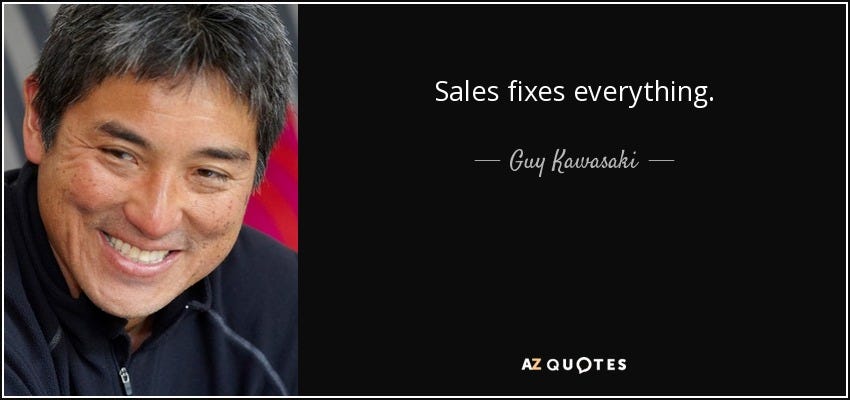Earnings? I don't need to show you no stinking earnings.
It's not easy being Green; maybe you don't need to be.
Founders at UC Berkeley SkyDeck have recently been debating whether revenue ought to be a goal or whether it is instead a misleading vanity metric. The implication is that they ought to be pursuing earnings and positive unit-economics instead.
It’s a hot topic. We may be at the start of a sea change in growth models for venture businesses. Kevin Roose at the NYT writes about the sunsetting of the MoviePass economy and the end of the millennial subsidy (or, as Kara Swisher calls it, “assisted living for millennials.”)
Roose writes:
There is still plenty of irrationality in the market, and some start-ups still burn huge piles of money in search of growth. But as these companies mature, they seem to be discovering the benefits of financial discipline. Uber lost only $108 million in the first quarter of 2021 — a vast improvement, believe it or not, over the same quarter last year, when it lost $3 billion, and both it and Lyft have pledged to become profitable on an adjusted basis this year.
I’ll go out on a limb and admit I don’t believe things are changing. The return to responsible accounting is happening suspiciously only after companies have been unloaded on the public.
As for how bad it’s been, Matt Levine opines on MoviePass’s hilarious business model and its sketchy moves to bolster it:
Giving people unlimited movie tickets for $10 a month is a good way to get rapid customer growth; telling people you’ll give them unlimited movie tickets for $10 a month, but not actually doing it, is a way to pivot to profitability.
When I describe it like that it sounds bad, but it was actually much worse!"
Can We Keep This Up?
There’s an old business joke that goes
We lose money on every sale…
but we make it up on volume
In the end earnings are all that matters for maintaining a sustainable business, but whether or not revenue ought to be your goal depends on the kind of company you’re building, in what environment you’re building it, and what timeframe you’re deciding for.
If your company has no available sources of capital other than operations, revenues don’t matter. Only profits keep the lights on. A lifestyle business needs to sustain its profitability and even pay attention to the timing of that profitability —its cash-flow—to survive. Its worth at any given moment is the “risk-adjusted present value of future cash flows.” Most of the numbers in that calculation need to be green.
But that’s not true for venture-fed companies. Their capitalization, and the timeframe in which to maximize it, is different.
For a business with access to speculative investment capital, premature focus on unit-economics, early focus on making each marginal unit profitable, falls prey to the engineering verity:
Premature optimization is the root of all evil
Once a market and one’s place in it are established, optimizing supply, costs, operations and pricing to make unit economics positive is crucial to avoid the company’s becoming a black hole for money. But tuning all these factors—making fulfilling a product cheap enough to make money on it—is a large investment which pays off only over the long term. Incurring those costs before having secured the marketplace is highly risky and likely to be a fatal blunder.
Venture investors aren’t even truly incentivized to consider the long term. Subsequent private or public markets often play the role of the greater fool, taking risk off earlier investors’ hands at a hefty premium before losses are reckoned with. And, in case it’s not clear from my tone, I’m not in any way in favor of this kind of wealth transfer. Nevertheless…
Not all Good Money is Green
Optimizing for revenue—selling at all costs—can help in the beachhead-establishing and growth phases of your company’s evolution. Among the things revenue does is validate your market, fuel funding, establish market dominance, rout your competition, and overcome your regulatory straightjackets.
Validating the Market. The fact that you have a substantial customer base paying you for something means you’ve shown demand for your product exists and you are solving real problems for real customers. This helps by:
Fueling Funding. Investors mostly look to revenues, not earnings, even up to after the company has gone public. They assume the company can work on being able supply product cheaply enough later, once they’re dominant. This assumption should be examined skeptically though; there number of cases where it turned out to be impossible to build favorable unit economics are legion, say Webvan, Sprig, Pets.com, and even on Uber the jury is still out.
Establishing Market Dominance and Routing Competition. We see this in momentum plays all the time. A company uses a huge war-chest to undercut potential competition. Venture capitalists face off to fuel a few contestants in a race to the bottom.
The winner out-loses the competition and in the process destroys legacy players in the space, creating new monopolistic opportunities. What started as a product promising to disintermediate inefficient entrenched old-school companies, ends up destroying them with subsidized prices, leaving them unconstrained pricing power. As Roose writes:
“Today my Uber ride from Midtown to JFK cost me as much as my flight from JFK to SFO,” Sunny Madra, a vice president at Ford’s venture incubator, recently tweeted, along with a screenshot of a receipt that showed he had spent nearly $250 on a ride to the airport.
Overcoming Regulatory Hurdles. The obvious way this is enabled is with massive spending on legal and marketing/lobbying efforts to fight regulations.
The more subtle and interesting way regulations are beaten back is illustrated by how Elon Musk is bringing autonomous vehicles to market. Instead of battling them head-on, Tesla’s cars flout regulations indirectly: they operate (somewhat) autonomously, but aren’t supposed to be used that way. You’re supposed to keep your hands on the wheel; unattended autonomous use is officially discouraged. But the public does so anyway, mostly not getting into trouble. By the time the regulators get around to trying to crack down on rampant unsanctioned use, the public is clamoring for the elimination of regulations they now see as dated, to preserve the capabilities with which they’ve become comfortable and now crave.
Desire for regulatory change is driven by seductive off-label use.
So, no, revenue is not a vanity metric. It may well be more important than profits.
As the wise man wrote:
Acknowledgements
Thanks to Simba Khadder for getting me thinking with a provocative Slack question. I’d love to hear your take in the comments.
Marc Meyer is a Silicon Valley technologist, founder (6 startups, 4 exits, 1 IPO), engineer, executive, investor, advisor, teacher and coach. He has invested in and advised over 140 companies. He advises and works with accelerators and funds including Alchemist, 500 Startups, HBS Alumni Angels and Berkeley SkyDeck, where he chairs the Advisor Committee. He has an Executive Coaching practice helping leaders navigate towards their greatest potential.





